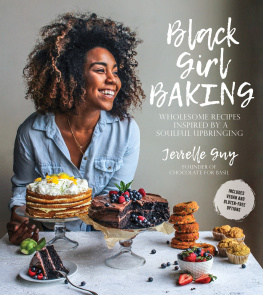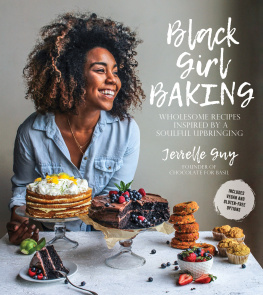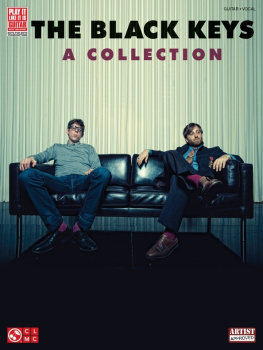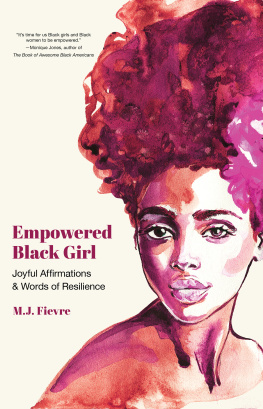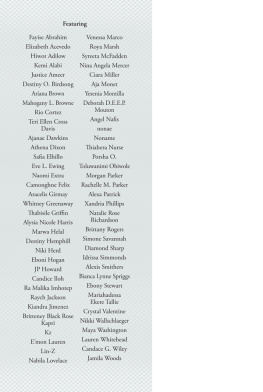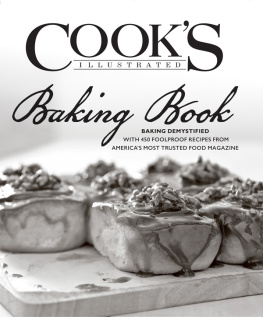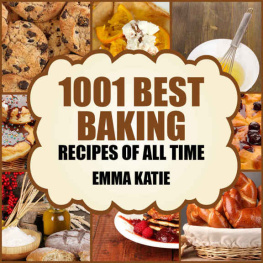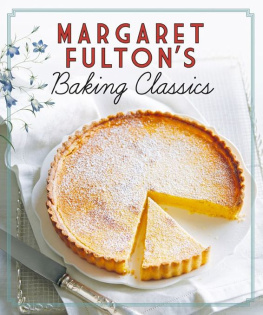Contents
Guide
Black
Girl
BAKING
WHOLESOME RECIPES
INSPIRED BY A
SOULFUL UPBRINGING
Jerrelle Guy
FOUNDER OF
CHOCOLATE FOR BASIL

The author and publisher have provided this e-book to you for your personal use only. You may not make this e-book publicly available in any way. Copyright infringement is against the law. If you believe the copy of this e-book you are reading infringes on the authors copyright, please notify the publisher at: http://us.macmillanusa.com/piracy.
TO EVERY BLACK GIRL
WHO CREATES HER OWN POWER,
IN HER OWN WAY



The biggest difference between the ten-year-old me and the me right now is that my younger self didnt have space for speaking up and being bold, or even being seen. And my daddy was always there reminding me to watch myself, know my place and grow thicker skin. He needed me tough and smart enough to withstand the grating world he knew, but instead, Id just slink away into my spaces of comfort, pull out a pencil to draw or write a poem about a girl, or find a big bowl of warm lasagna to sink my face into.
Ive learned to stop apologizing for this part of myself. Its that very introversion coupled with my upbringing that has inspired this book. The collection of recipes Im sharing are a mishmash of my life: my black roots, the Chamorro food my mother peppered throughout my childhood, the Caribbean islands that were my neighbors and the places my love for food has taken me to, including Italy, Texas, New York and finally, where I live now, Boston. New places are always opening my eyes and helping me think outside the box, but I always bring pieces of home with me as I move, and it helps me create a temporary safe space wherever I land.
I was born in a small city called Lantana in Palm Beach County, Florida. It was an interesting place to be raised. My memories of growing up there are rich, and I cant erase them, specifically the ones where food was involved.
Racism wisped westward through the beautiful draping palm trees off the east coast, landing on the left side of the citys bridge, leaving behind strife and social divide. It was like its own hurricane. But there was so much life on our side of town, and the food was infused with Jamaican, Haitian and Cuban cultureblack beans and rice, fried plantanos, sauted cabbage and carrotsand then of course, for me, the interwoven cuisines of both my parents.
My father, a Southern-born and -raised black man, has always appreciated a heavy plate, his meat front and center, and smothered in white sauces or brown gravies. That or something his mother would reel in on a rod that morning, scale and fry on her kitchen stove that afternoon. And then theres my mother, an island girl from Guam, who came from hard times and wont ever part from the comfort of salty, canned meats splayed over big bowls of sticky rice. Her tastes took hold of my tongue too, and now theres no stew that feels complete without a generous dousing of soy sauce and white vinegar.
And while Id love to recite the grandmother story, about how Id stand at her hip, staring up while she stirred a pot of greens or mixed a bowl of battered bread as shed narrate the next step in a recipe, there was nothing that felt romantic about watching her cook. It was something that was done because it had to be done. Whether shed stretch breakfast eggs with a pinch of baking powder to feed a slew of us children, or pickle her green beans to keep them from spoiling, there was always a sobering sense of labor spilling over from her days on the farm back in Mississippi with her sister. And when she did take me fishing by the lake or canal to cajole some catfish for dinner, I never could keep up with her, snapping her twine and frustrating the hell out of her until shed snatch the pole back. Big Mas kitchen was a place where things happened in solitude. I never asked, she never really offered and Id just wait for someone to tell me I could enter. The times I did stumble by or into it, Id be left with an inerasable smell of dead sea-meat or the image of the kitchen floor scattered with old newspapers and fish scales. There was nothing romantic about it at all. It was practical business.
Food romance came much later, after years of bulk buying, cans and corner stores, after more years of honey buns, Jamaican patties, hot sausages, peas and rice, corned beef hash and many other things filled with sugar and salt. I remember we kept so many canned vegetables that I was the school hero in elementary school when the local can drive would launchI had that box full to the brim.

